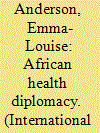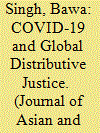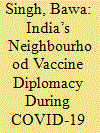|
|
|
Sort Order |
|
|
|
Items / Page
|
|
|
|
|
|
|
| Srl | Item |
| 1 |
ID:
159973


|
|
|
|
|
| Summary/Abstract |
Health crises pose fundamental challenges to international relations and have been a major focal point of contests for global influence, particularly in the global South, where such crises are most acute. This necessitates a focus on the arenas of global health diplomacy and the power struggles that emanate from them, including the often-overlooked agency of African actors within these arenas. Drawing upon a total of 3 months of fieldwork in 2007 and 2014 that included 68 key-informant interviews, participant observations, and informal discussions, this article interrogates the mechanics of multi-stakeholder health diplomacy in Malawi, where a near-permanent state of health crisis and underdevelopment has generated extreme dependency on external health assistance. This article conceptualises shadow diplomacy as the informal networks and channels of influence that run parallel to, but are not recognised as part of, formal diplomacy. This concept reveals how health is key to struggles for leverage by both international and local actors, giving rise to informal and subversive manifestations of diplomacy in the ‘shadows’. It enables us to understand not only how Western powers consolidate and obscure their enduring power but also how the ‘shadows’ benefit African political elites as they leverage their dependency to subvert global power structures for their own ends. It disrupts the external/internal binary of international donors/African states and reveals that these are not monolithic actors but instead comprising complex individuals with multi-faceted motivations and divided loyalties.
|
|
|
|
|
|
|
|
|
|
|
|
|
|
|
|
| 2 |
ID:
193198


|
|
|
|
|
| Summary/Abstract |
The second wave of the COVID-19 pandemic had left heart-wrenching impacts on all facets of life in general and the availability, accessibility, and affordability of medicines and vaccines in particular. Rather, the world has been divided into two groups regarding access to medicine and vaccines as haves and have-nots. The rich countries had pre-ordered the vaccines of COVID-19 along with the holding of the same. The pandemic situation was further worsened, given the Trade-Related Intellectual Property Rights (TRIPS) in practice and restrictions on sharing technology of vaccines, medicines, and life-saving equipment. In this context, India and South Africa have proposed the joint proposal and garnered support for waiving off TRIPS to ensure equity, accessibility, and affordability of vaccines and the same as public goods. In this review, we emphasize that global justice is one of the important elements of normative international theories, which focus on all the moral obligations from the world’s rich to the world’s poor. The paper also questions and argues that if the rich countries fail to go by the principles of global justice, can the Indian and South African (SA) patent diplomacy play a catalyst role in global justice? The review concludes with an emphasis on global solidarity, and the acceptance of joint India–South Africa’s “patent diplomacy” for TRIPS waiver would result in mass production and fair distribution, making the COVID-19 medicines and technologies available to everyone regardless of their poor–rich status.
|
|
|
|
|
|
|
|
|
|
|
|
|
|
|
|
| 3 |
ID:
185860


|
|
|
|
|
| Summary/Abstract |
The COVID-19 pandemic has exposed increasing global inequality in responding to the issues of health. How do we resolve the tension between normative concerns for global responsibility and strategic concerns for national interest in facilitating health aid to vulnerable populations in low-income countries in the COVID-19 era? This article presents global health diplomacy as a conceptual framework that could overcome the dichotomy of humanitarianism and international politics, using health aid to North Korea during COVID-19 as a case-study. Health is a critical component of human dignity and can be a normative motivation for cooperation beyond sovereign borders. However, health is also an important element of national interest and can be a strategic motivation for transnational cooperation. The overlap between the moral and rational spaces in global health diplomacy demonstrates how COVID-19 assistance to North Korea's vulnerable population is in the enlightened self-interest of donors to prevent resurgences of new COVID-19 variants. Moreover, this framework imbues all parties, including aid recipients such as North Korea, with the global cooperative responsibility to address health. In this sense, global health diplomacy can reframe the tensions between humanitarianism and politics, morality and rationality, and cosmopolitanism and nationalism, from antithetical to complementary.
|
|
|
|
|
|
|
|
|
|
|
|
|
|
|
|
| 4 |
ID:
141059


|
|
|
|
|
| Summary/Abstract |
Ideas of smart power and Global Health Diplomacy have developed considerable prominence over the past decade in, respectively, the foreign policy and public health communities. Although in some respects separate, both suggest the potential for using health assistance to generate political as well as health benefits. The conflicts in Iraq and Afghanistan provide an opportunity to examine these assertions at the ‘sharp end’. We consider both the health and wider strategic benefits of health assistance in these conflicts, as well as some of the ethical challenges involved. We conclude however that we should adopt the precautionary principle because: there is doubt over the quality of health services provided in such circumstances; concern over the wider effects of politicising health aid; and little proof that the claimed strategic benefits materialise in practice.
|
|
|
|
|
|
|
|
|
|
|
|
|
|
|
|
| 5 |
ID:
193027


|
|
|
|
|
| Summary/Abstract |
In recent years, India has established itself as the world’s ‘pharmacy hub’, and this claim was proven once again when it delivered COVID-19 vaccines to its citizens, neighbouring nations and across the globe. Following the philosophy of humanitarianism through the principle of ‘Vasudhaiva Kutumbakam’, India has decided to provide the COVID-19 health assistance to its immediate neighbouring countries. India’s immediate neighbourhood refers to the countries that are geographically adjacent to it. In addition, India’s vaccine diplomacy has exposed geopolitical fault lines in South Asia as China’s vaccine diplomacy aims to outpace India in the region. Against this background, the main objective of this paper is to explain and examine India’s vaccine diplomacy as an instrument of its ‘Neighbourhood First’ policy during the COVID-19 pandemic. It argues that India’s health-focused approach has proved effective and aligned with its national interests. This review demonstrates that India’s health diplomacy has had an impact on medical and humanitarian assistance reciprocation at the regional and international levels. As a result of this strategy, during the second wave of the pandemic, India received medical devices and vaccines from other countries in dealing with COVID-19.
|
|
|
|
|
|
|
|
|
|
|
|
|
|
|
|
| 6 |
ID:
139584


|
|
|
|
|
| Summary/Abstract |
Tackling germs, negotiating norms, and securing access to medicines are persistent challenges that disproportionally affect developing countries' participation in global health governance. Furthermore, over the last two decades, the excessive focus on global pandemics and security in global health diplomacy, rendered peripheral diseases that usually strike the poor and vulnerable, creating situations of marginalisation and inequality across societies. However, as the importance of regions and regionalism increases in global politics, and integration ambitions and initiatives extend beyond trade and investment to embrace welfare policy, there are new opportunities to explore whether and how regional commitments affect health equity and access to medicine in developing nations. What, if any, are the possibilities for meso-level institutions to provide leadership and direction in support of alternative practices of global (health) governance? Can regional polities become international advocacy actors in support of global justice goals? This article addresses these questions by analysing regional health diplomacy in South America. The article argues that regional organisations can become sites for collective action and pivotal actors in the advocacy of rights (to health) enabling diplomatic and strategic options to member state and nonstate actors, and playing a role as deal-broker in international organisations by engaging in new forms of regional health diplomacy.
|
|
|
|
|
|
|
|
|
|
|
|
|
|
|
|
| 7 |
ID:
169208


|
|
|
|
|
| Summary/Abstract |
Global Health Diplomacy has been instrumental in achieving many of the world’s global health goals, such as the Millennium Development Goals. The new Sustainable Development Goals are ambitious, and all tools need to be employed to make sure they are achieved by the 2030 deadline. This paper reviews the successes and failures of the health-related Millennium Development Goals. It uses the lessons learned to put forward a sustainable approach toward the Sustainable Development Goals, and explores the role of Global Health Diplomacy in advancing the health goals.
|
|
|
|
|
|
|
|
|
|
|
|
|
|
|
|
|
|
|
|
|